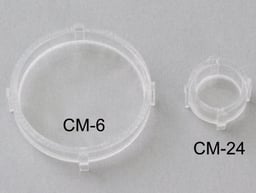Atelocollagen Membrane for 6-Well Culture Plate
KKN-CM-6
Brand: AteloCell®
A permeable membrane for 50mm culture dish, 6-well culture plate allows amino acids and other small molecules to move freely.

Currency:
| Product name | Catalog number | KOKEN Code | Pack size | Price | Price (USD) | Price (GBP) | Price (EUR) |
|---|---|---|---|---|---|---|---|
| Atelocollagen Membrane for 6-Well Culture Plate | KKN-CM-6 | CM-6 | 24 pieces | (select above) | $ 851.00 | £ 810.00 | € 946.00 |
Product inquiries from USA
Product inquiries from UK or Europe
Product inquiries from India
Note: prices shown do not include shipping and handling charges.
Product Information
Applications
- Cell culture
Features
- Microscopic observation of the cells is possible during the culture due to high membrane transparency.
- Cell culture on collagen membrane creates a natural environment that resembles in vivo systems.
KOKEN company name and logo and AteloCell brand are the property of KOKEN Corp. Ltd., Japan.
Product Name: Atelocollagen membrane for 6 well culture plate
Catalog Number: KKN-CM-6
Size: 6 pieces
Storage and Stability: Store at −20 °C
Sterility: Sterile
Notice To Purchaser: REPROCELL is a licensed global distributor of KOKEN’s collagen-derived products everywhere, except for Japan.
Manufacturer: Koken Co., Ltd. (Japan)
Specification Sheets:
- Lu H, et al. Comparison of decellularization techniques for preparation of extracellular matrix scaffolds derived from three-dimensional cell culture. (2012) J Biomed Mater Res A. 100(9):2507-2516.
- Kobayashi Y, et al. Synthesis of functional artificial lymphoid tissues. (2011) Discov Med. 12(65):351-362.
- Kitajima T, et al. A fusion protein of hepatocyte growth factor for immobilization to collagen. (2007) Biomaterials. 28(11):1989-1997.
- Okamoto N, et al. Artificial lymph nodes induce potent secondary immune responses in naive and immunodeficient mice. (2007) J Clin Invest. 117(4):997-1007.
- Ueno A, et al. Constitutive expression of thrombospondin 1 in MC3T3-E1 osteoblastic cells inhibits mineralization. (2006) J Cell Physiol. 209(2):322-332.
- Suematsu S, et al. Generation of a synthetic lymphoid tissue-like organoid in mice. (2004) Nat Biotechnol. 22(12):1539-1545.
- Yasui T, et al. Determination of collagen fiber orientation in human tissue by use of polarization measurement of molecular second-harmonic-generation light. (2004) Appl Opt. 43(14):2861-2867.
- Yamanouchi K, et al. Bone formation by transplanted human osteoblasts cultured within collagen sponge with dexamethasone in vitro. (2001) J Bone Miner Res. 16(5):857-867.
- Fujimoto E, et al. Beneficial effect of basic fibroblast growth factor on the repair of full-thickness defects in rabbit articular cartilage. (1999) Arch Orthop Trauma Surg. 119(3-4):139-145.
- Matsumoto A, et al. Induction of enamel matrix protein expression in an ameloblast cell line co-cultured with a mesenchymal cell line in vitro. (2011) In Vitro Cell Dev Biol Anim. 47(1):39-44.
- Nakamura M. et al. Promotion of angiogenesis by an artificial extracellular matrix protein containing the laminin-1-derived IKVAV sequence. (2009) Bioconjug Chem. 20(9):1759-1764.
- Orisaka M. et al. Effects of ovarian theca cells on granulosa cell differentiation during gonadotropin-independent follicular growth in cattle. (2006) Mol Reprod Dev. 73(6):737-744.
- Suzuki T. et al. Puromycin aminonucleoside induces apoptosis and increases HNE in cultured glomerular epithelial cells. (2001) Free Radic Biol Med. 31(5):615-623.
- Ishikawa H. et al. Psoriatic fibroblasts enhance cornified envelope formation in normal keratinocytes in vitro. (1997) Arch Dermatol Res, 289(9):551-553.
- Miyauchi Y. et al. Feasibility of in vitro culturing of lesional psoriatic keratinocytes in medium containing high calcium concentrations. (1995) Arch Dermatol Res. 287(8):731-734.
- Hatou S, et al. Functional Corneal Endothelium Derived from Corneal Stroma Stem Cells of Neural Crest Origin by Retinoic Acid and Wnt/β-Catenin Signaling. (2013) Stem Cells Dev. 22(5):828-839.
- Kimoto M, et al. Role of hepatocyte growth factor in promoting the growth of human corneal endothelial cells stimulated by L-ascorbic Acid 2-phosphate. (2012) Invest Ophthalmol Vis Sci. 53(12):7583-7589.
- Kaji H. et al. Electrically induced contraction of C2C12 myotubes cultured on a porous membrane-based substrate with muscle tissue-like stiffness. (2010) Biomaterials. 31(27):6981-6986.
- Hida N. et al. Novel cardiac precursor-like cells from human menstrual blood-derived mesenchymal cells. (2008) Stem Cells. 26(7):1695-1704.
- Kinebuchi Y. et al. Direct induction of layered tissues from mouse embryonic stem cells: potential for differentiation into urinary tract tissue. (2008) Cell Tissue Res. 331(3):605-615.
- Oyasu M. et al. Immunogold electron microscopic demonstration of distinct submembranous localization of the activated gammaPKC depending on the stimulation. (2008) J Histochem Cytochem. 56(3):253-265.
- Miyashita H. et al. Characterization of hair follicles induced in implanted, cultured rat keratinocyte sheets. (2004) Exp Dermatol. 13(8):491-498.
- Youdim KA. et al. Interaction between flavonoids and the blood-brainbarrier in vitro studies. (2003) J Neurochem. 85(1):180-192.
- Agu RU. et al. In-vitro nasal drug delivery studies: comparison of derivatised, fibrillar and polymerised collagen matrix-based human nasal primary culture 2 systems for nasal drug delivery studies. (2001) J Pharm Pharmacol. 53(11):1447-1456.
- Selvaratnam L. et al. Permeability barrier properties of oral keratinocyte cultures: a model of intact human oral mucosa. (2001) Oral Dis. 7(4):252-258.
- Kahn CR. et al. Human corneal epithelial primary cultures and cell lines with extended life span: in vitro model for ocular studies. (1993) Invest Ophthalmol Vis Sci. 34(12):3429-3441.